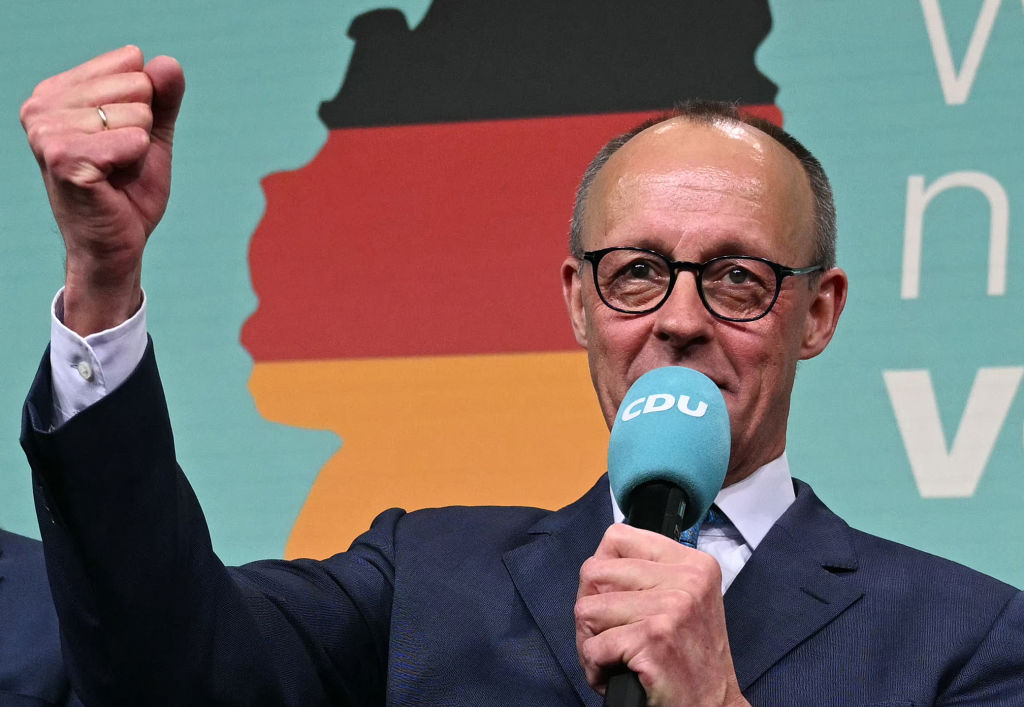
It is salutary to remember that the man set to take over Germany has not had any role in government. Friedrich Merz, whose Christian Democrats won a comfortable if unconvincing victory in Sunday’s elections, will form a government at a time of tumult on multiple fronts.
He faces an economy reeling from a decade of under-investment and entering its third year of recession, an immigration crisis exacerbated by a series of lone terror attacks, and the ever-growing popularity of the far-right Alternative for Germany (AfD). Most of all it is facing the unprecedented collapse of relations with the U.S., on whom Germans have relied on for security since the end of World War Two.
[time-brightcove not-tgx=”true”]
Merz would see himself as a classic Conservative of the old school, somewhere perhaps between Ronald Reagan and George H. W. Bush, a believer in traditional social values and the established security and political architecture of the postwar era that has bound Germans into the Transatlantic alliance.
When Donald Trump was re-elected U.S. President in November, Merz was confident he could do business with him—two fist-pumping men who wanted to slash bureaucracy, cut taxes, and wage war on “woke.” Yet the confrontational approach of Trump’s lieutenants at the recent Munich Security Conference—in which they lauded praise on the AfD—has changed that.
The 69-year-old Merz—a man who has interspersed politics with boardroom life as Chairman of the German arm of Blackrock, the investment house—is keen not to waste time. As he made clear during his victory speech, “the world isn’t waiting for us.” Germany, he added, could not spend months haggling over the finer points of a coalition agreement while Ukraine’s fate is decided by Trump and the man whom they feel has captured him, Russia’s Vladimir Putin.
Kaja Kallas, the E.U.’s chief diplomat, reiterated that point, expressing the hope that a new government is formed “as quickly as possible, as we really need to move on with decisions at the European level which requires German participation.”
With Emmanuel Macron in Washington today, and Keir Starmer following on Thursday, Europe is seeking to persuade Trump to step back from his seeming endorsement of Putin’s Ukraine position. Both the French and British leaders have been coordinating their positions, stressing the need for quiet diplomacy. But within hours of securing his election victory, Merz appeared to take a more confrontational approach toward the White House.
“My absolute priority will be to strengthen Europe as quickly as possible so that, step by step, we can really achieve independence from the USA,” Merz said Sunday, before even the final election tally came in.
Some wondered whether this might be another example of an impetuousness that is seen, even by his confidants, as a weak spot in Merz’s character. Yet he doubled down on his position the following morning: “Now more than ever, we must put Ukraine in a position of strength. For a just peace, the attacked country must be part of peace negotiations.”
For such talk to have substance, Merz will have to show that he is prepared to borrow more to ramp up Germany’s defense budget. A decade after NATO members agreed to devote a minimum of 2% of GDP for military spending, Germany only reached that target in 2024. In order to increase it to 2.5%, let alone a new 3% target, will cost tens of billions. For that, the incoming government will have to reform its so-called “debt brake” that places stringent limits on public debt.
It seems that Merz is prepared to do that, with the support of the center-left Social Democrats. The outgoing Chancellor Olaf Scholz’s SPD suffered a humiliating result, falling into third place to a historic low. They are now expected to play a junior role in a center-right administration. Yet some of Merz’s agenda will be hard for it to accede to, particularly elements of his economic reform package such as welfare cuts and tax breaks, and his plans to crack down hard on illegal migration.
In one respect, the row with Trump makes Merz’s task harder; it is a warning to mainstream on the politicians on both the left and right of what may follow if they fail to form a durable coalition. Encouraged by its best-ever result, with 20% of the vote, and boosted by the boisterous support of Elon Musk and others in the Trump Administration, the AfD is waiting in the wings. It is preparing a second front of attack the moment the new government faces its next crisis.
The far-right in Germany is confident that its moment will come, again.



